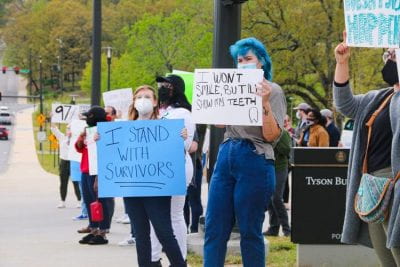
Elizabeth Burger, a junior, stands alongside students and UA community members Friday as they chant outside the John Tyson building.The rally was organized by the GPSC and other on-campus groups, including ASG, the Lavender Society and the UARK Black Graduate Student Association. Photo courtesy the Arkansas Traveler.
Honors College Fellow Michael Fuhrman is a history and psychology double major from Bryant, Arkansas.
“Just being able to sit in the backyard is very important,” is something I rarely consider. Kaleem Nazeem – board member for Arkansas’s DecARcerate – challenged us to think differently. Sentenced to life without possibility of parole at 17, Nazeem served 28 years in the Arkansas Department of Correction until he was allowed for re-sentencing due to the 2018 United States Supreme Court decision in Miller v. Alabama. Now, to a group of 30 honors undergraduates, Nazeem was speaking about the importance of breathing deeper.
It can be said without a doubt that this past academic year has been marked by frustrations. Students at the University of Arkansas were prepared to advocate for change and sought to leave their university a more ethical, prepared, and safe place for any student. Manifesting as multiple protests dealing with the presence of J. William Fulbright and Charles Hillman Brough on campus and criticism towards our Title IX office and legal settlements, students picked up their signs to stand their ground on more than one occasion. Coming out of this academic year, I was curious about what motivates protest and how its historical context informs the actions we take today. This curiosity led me to the Honors Arkansas Forum Dissent/Protest with Dr. Whit Barringer hosted by the University of Central Arkansas Honors College.
Joined by students from various honors colleges around the state, the goals of this course were to facilitate conversation on the purpose of dissent in the public arena. The majority of this was done through in-depth dives into historical moments and meetings with current social justice leaders in Arkansas. This included meeting with Zachary Crow and Kaleem Nazeem of DecARcerate. Speaking with them I learned more about the prison system in Arkansas than I had previously. The Tucker Unit (or Tucker prison farm) is an example of the facilities we discussed. Tucker Unit is located in Jefferson County and can accommodate approximately 910 inmates. Along with its educational programs, the complex also utilizes prison labor to pick cotton, cucumbers, and rice. Immediately I’m concerned. I knew of the historical relationship between the system of slavery and the prison industrial complex through literature like Dr. Angela Davis’s Are Prisons Obsolete? but failed to recognize the direct relationship of these systems in my own state.
DecARcerate works towards ending juvenile life sentences (like the one Nazeem received) and stopping the use of solitary confinement across the state. They work with the hope that one day everyone can sit in their own backyard. Their mission and principles were things I could have encountered in my daily life, but it is thanks to the course Dissent/Protest that I was able to interact first-hand with their leaders and organizers. It’s because of this course that I can reflect on the action and motion of students on my own campus. john a. powell (intentionally not capitalized) who serves as the director for the University of California at Berkeley’s Othering and Belonging Institute believes that one does not belong within their community until they can make just demands of the community. As students on campus continue to make demands and continue to see bureaucratically slow progress, there will still be frustrations. When faced with frustrations, I hope that myself and others seeking to bring change to our communities find value in the deeper breaths we can take. I hope we continue to build a universal backyard.
